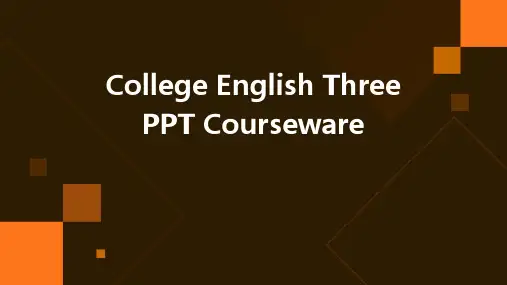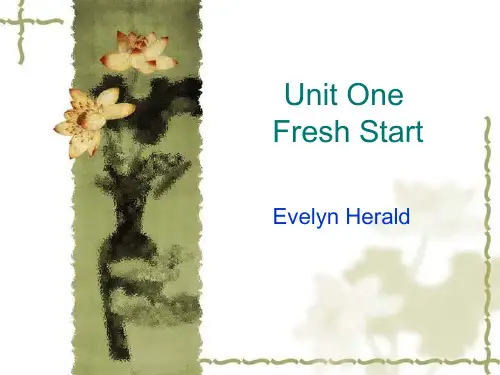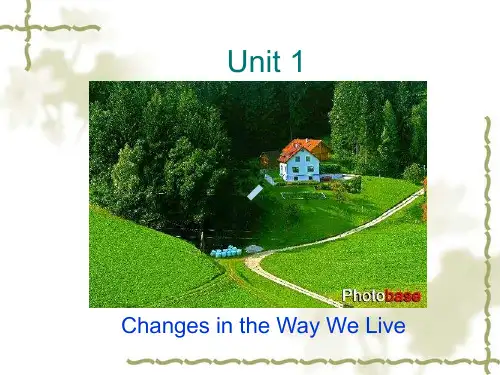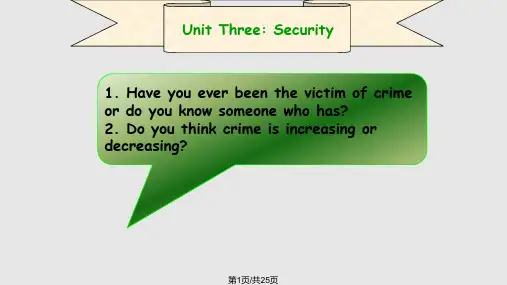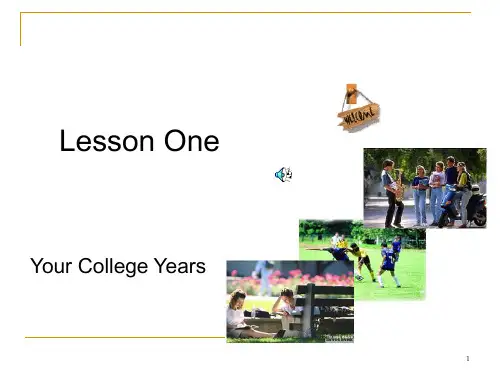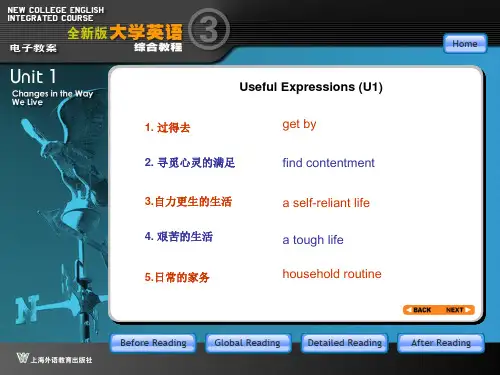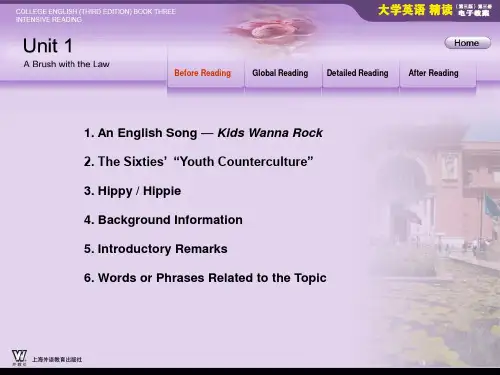11大学英语专业第三册ppt
- 格式:ppt
- 大小:133.00 KB
- 文档页数:51

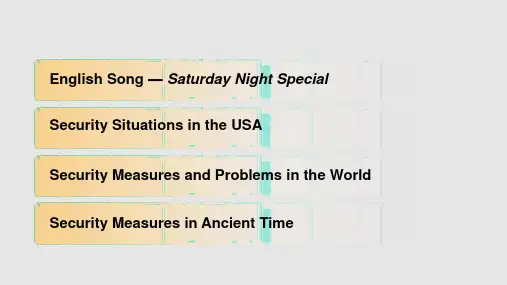
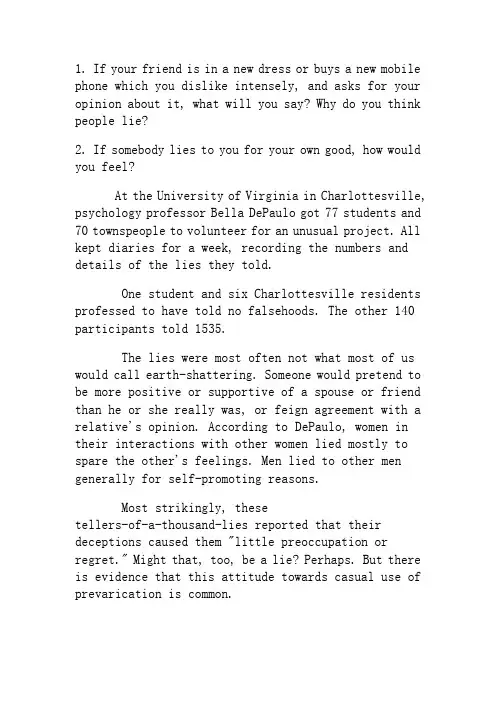
1. If your friend is in a new dress or buys a new mobile phone which you dislike intensely, and asks for your opinion about it, what will you say? Why do you think people lie?2. If somebody lies to you for your own good, how would you feel?At the University of Virginia in Charlottesville, psychology professor Bella DePaulo got 77 students and 70 townspeople to volunteer for an unusual project. All kept diaries for a week, recording the numbers and details of the lies they told.One student and six Charlottesville residents professed to have told no falsehoods. The other 140 participants told 1535.The lies were most often not what most of us would call earth-shattering. Someone would pretend to be more positive or supportive of a spouse or friend than he or she really was, or feign agreement with a relative's opinion. According to DePaulo, women in their interactions with other women lied mostly to spare the other's feelings. Men lied to other men generally for self-promoting reasons.Most strikingly, these tellers-of-a-thousand-lies reported that their deceptions caused them "little preoccupation or regret." Might that, too, be a lie? Perhaps. But there is evidence that this attitude towards casual use of prevarication is common.For example, 20,000 middle-and high-schoolers were surveyed by the Josephson Institute of Ethics — anonprofit organization in Marina del Rey, California, devoted to character education. Ninety-two per cent of the teenagers admitted having lied to their parents in the previous year, and 73 per cent characterized themselves as "serial liars," meaning they told lies weekly. Despite these admissions, 91 per cent of all respondents said they were "satisfied with my own ethics and character."Think how often we hear the expressions "I'll call you" or "The check is in the mail" or "I'm sorry, but he stepped out." And then there are professions —lawyers, pundits, public relations consultants —whose members seem to specialize in shaping or spinning the truth to suit clients' needs.Little white lies have become ubiquitous, and the reasons we give each other for telling fibs are familiar. Consider, for example, a corporate executive whom I'll call Tom. He goes with his wife and son to his mother-in-law's home for a holiday dinner every year. Tom dislikes her "special" pumpkin pie intensely. Invariably he tells her how wonderful it is, to avoid hurting her feelings."What's wrong with that?" Tom asked Michael Josephson, president of the Josephson Institute. It's a question we might all ask.Josephson replied by asking Tom to consider the lie from his mother-in-law's point of view. Suppose that one day Tom's child blurts out the truth, and she discovers the deceit. Will she tell her son-in-law, "Thank you for caring so much"? Or is she more likelyto feel hurt and say, "How could you have misled me all these years? And what else have you lied to me about?"And what might Tom's mother-in-law now suspect about her own daughter? And will Tom's boy lie to his parents and yet be satisfied with his own character?How often do we compliment people on how well they look, or express our appreciation for gifts, when we don't really mean it? Surely, these "nice lies" are harmless and well-intended, a necessary social lubricant. But, like Tom, we should remember the words of English novelist Sir Walter Scott, who wrote, "What a tangled web we weave, when first we practice to deceive."Even seemingly harmless falsehoods can have unforeseen consequences. Philosopher Sissela Bok warns us that they can put us on a slippery slope. "After the first lies, others can come more easily," she wrote in her book Lying: Moral Choice in Public and Private Life. "Psychological barriers wear down; the ability to make more distinctions can coarsen; the liar's perception of his chances of being caught may warp."Take the pumpkin-pie lies. In the first place, it wasn't just that he wanted his mother-in-law to feel good. Whether he realized it or not, he really wanted her to think highly of him. And after the initial deceit he needed to tell more lies to cover up the first one.Who believes it anymore when they're told that the person they want to reach by phone is "in a meeting"? By itself, that kind of lie is of no great consequence.Still, the endless proliferation of these little prevarications does matter.Once they've become common enough, even the small untruths that are not meant to hurt encourage a certain cynicism and loss of trust. "When [trust] is damaged," warns Bok, "the community as a whole suffers; and when it is destroyed, societies falter and collapse."Are all white lies to be avoided at all costs? Not necessarily. The most understandable and forgivable lies are an exchange of what ethicists refer to as the principle of trust for the principle of caring, "like telling children about the tooth fairy, or deceiving someone to set them up for a surprise party," Josephson says. "Still, we must ask ourselves if we are willing to give our friends and associates the authority to lie to us whenever they think it is for our own good."Josephson suggests a simple test. If someone you lie to finds out the truth, will he thank you for caring? Or will he feel his long-term trust in you has been undermined?And if you're not sure, Mark Twain has given us a good rule of thumb. "When in doubt, tell the truth. It will confound your enemies and astound your friends."New words:volunteerv. to give or offer (one's help, a suggestion, etc.) willingly or without being paidprofessv. to make a claimfeignv. to pretend to have or bepreoccupationn. the state of constantly thinking or worrying about somethingprevaricationn. the state of avoiding giving a direct answer or making a firm decisionseriala. of, in or forming a number of things, events, etc. of a similar kind, especially placed or occurring one after anotherethicsn. moral correctness; moral principlespunditn. a person who is an authority on a particular subject; an expertconsultantn. a person who gives specialist professional advice to othersfibn. a small unimportant liedeceitn. dishonest act or statementlubricantn. a substance such as oil which cause a machine to operate more easilytanglev. to make or become a mass of disordered and twisted threadswear downto reduce or become weaker until uselessperceptionn. the ability to see, hear and understand; the quality of understandingwarpv. to (cause to) turn or twist out of shapeproliferationn. a rapid increase in the amount or number of somethingcynicismn. the belief that people always act selfishlyfalterv. to lose power or strength in an uneven way, thus no longer making much progressassociaten. a person who is connected to another person as a businesspartner, colleague, or companionunderminev. to gradually make somebody or something less strong or effectiveconfoundv. to confuse and greatly surprise people, causing them to be unable to explain or deal with a situationastoundv. to make somebody very surprised or shocked, especially with (news of) something completely unexpected。
